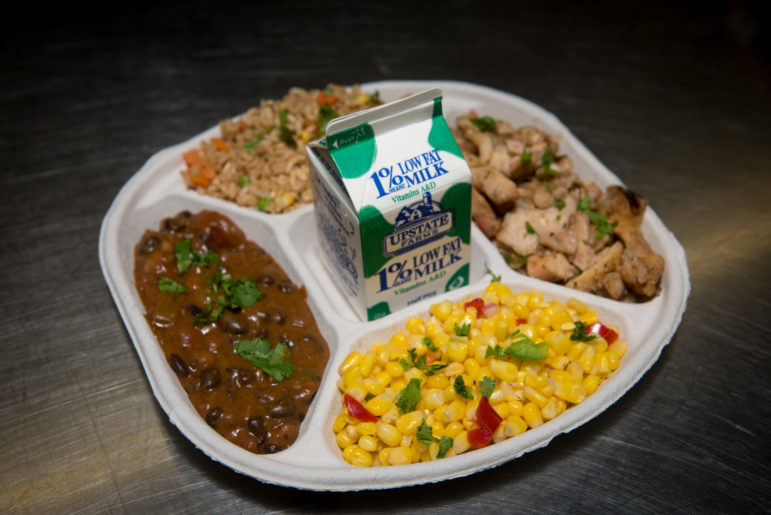“Many food management companies and producers of color are small to mid-sized, and we have benefited from the added flexibility in the way schools negotiate. The waivers have allowed us to retain staff and pay an honest living wage and continue buying fresh produce while serving scratch-made meals to a larger student body.”

Michael Appleton/Mayoral Photography Office
Millions of American children could go hungry this summer unless Congress acts soon. That’s because an end looms on June 30 for a series of special COVID-era waivers. Among other things, they allow schools to serve free meals to all students. But eliminating the waivers risks more than hunger, It also jeopardizes other gains made in child nutrition programs under the waivers.
There are more than two dozen waivers, tackling everything from easing the congregate-feeding requirement, which requires children to travel to a central location and eat their meals together at the site, to eliminating the need for household income verification. New York and Illinois are two states which have announced they are extending the emergency contract option for food service into next year, and other states can follow their lead.
The overall intent of the waivers is reasonably simple: Allow school systems to have more flexible conversations with food service management companies and feed more children without administrative red tape. When it comes to feeding kids, these conversations are not only focused on price. They also focus on the values schools are communicating when they make food choices. They allow decision-makers to broaden relationships with suppliers in the communities they serve and use food service to signal the importance of culture and community to their children.
Many food management companies and producers of color are small to mid-sized, and we have benefited from the added flexibility in the way schools negotiate. The waivers have allowed us to retain staff and pay an honest living wage and continue buying fresh produce while serving scratch-made meals to a larger student body. The end of the waivers jeopardizes our success, and the success of others like us around the country and here in New York.
Under another of the waivers, Summer Food Service Program prices have ensured the viability of small providers, even as there has been a 13 percent increase in food prices. The lunch reimbursement rate is slightly higher under the program at around $4.50 per meal. Without it, providing scratch-made meals and serving them in individual containers for less than $3.85 is a difficult task.
Food is also a huge part of how we make kids feel. Our food matters not only because it’s integral to good health. It matters because what we eat is an essential part of our cultural identity and sense of self. Likewise, school districts have long used food to reinforce cultural hierarchy. That is why it’s a step towards social justice to acknowledge the cultural heritage of the food you serve. Yes, you can put a price on good food. But aspects of this equation are also priceless. They function on a deeper and more humane plane.
All children deserve good, nutritious food and kids feel good eating what they know. Popular dishes like jollof rice or chana masala feed more than hunger. They foster joyful connections to home. If the Summer Food Service Program and some of the other waivers run out, we will have tough conversations with our strategic partners. It will impact the supply chain. Our kitchen staff cook our meals from scratch; They use local ingredients and focus on cultural relevance. They shop from farmers of color to feed kids of color. The reality is that the waivers ending threatens all such people and their livelihoods. Representation on the plate helps kids build their cultural identity. Ending it does the opposite.
The bipartisan Support Kids Not Red Tape Act may yet preserve the waivers for another year. Sen Lisa Murkowski (R-Alaska) and Sen Debbie Stabenow (D-Michigan) authored the bill. Congress needs to act now. Childrens’ nutrition and their cultural nourishment depend on it.
Feeding our kids should not be a race to the bottom. If it is, then small businesses will get swallowed up by major conglomerates. Such organizations still focus on feeding their shareholders first, then nourishing children. There is an inherent value in feeding our children nutritious and culturally relevant meals and the waivers have allowed us to do just so.
Nausher Khan is an advisory board member of the National Farm to School Network and director of strategic business partnerships at Red Rabbit, LLC, USA’s largest Black-owned school food management company celebrating food from all cultures in the cafeteria.








